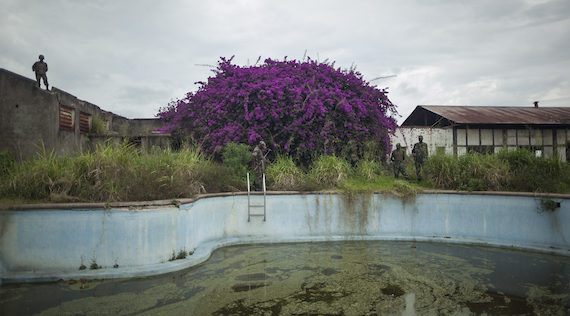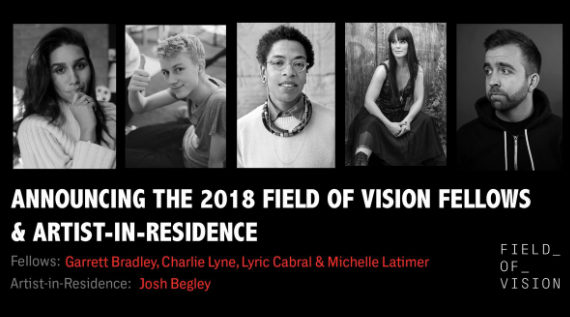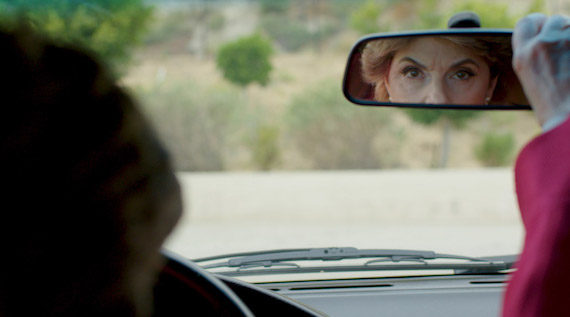
Writing by Lacey Beattie. Lacey is a graduate student at the Feirstein Graduate School of Cinema, pursuing a Masters of Cinema Studies. She is also a publicity intern at entertainment public relations firm ID PR and previously interned at Picture Motion, the leading marketing and advocacy firm for issue-driven films. Lacey was on the judging committee for the documentary category of the 2018 Peabody Awards, and is a volunteer at DOC NYC, New York Film Festival, Tribeca Film Festival and Rooftop Films. Follow her on Instagram and Twitter @lacey_bead.
From the frontlines of one of the world’s longest wars, the documentary This Is Congo captures the region’s tumultuous history spanning through decades of corruption that has left the Congolese living in poverty and desperately trying to survive. Right from the opening scene, beautiful panoramic shots of the mountain ranges and idyllic farms are quickly disrupted by shots of gunfire as a voiceover lays out the simple truth that growing up in the Congo equals misery. From there, director Daniel McCabe, who initially started the film as a look at the ongoing problem of mineral smuggling across the border, takes the audience on a journey throughout a complex political and economic history and reveals the struggles and fears within the daily lives of the people who call the Congo home.
The documentary covers the ongoing turbulence in the region and unveils a lot of historical context, including background on the colonial past and an overview of the conflict between the Hutu and Tutsi resulting in the Rwandan Civil War. In turn, viewers are given the whole picture of how this present came to be. Today, we’re witnessing the power struggle between the national army and the rebel group M23 over the control of Goma, the capital city of the Northern Kivu. This conflict stems from the rebel forces’ fight against President Joseph Kabila’s corrupt government, and the fact that though the country is full of rich minerals and resources the people are condemned to live in poverty and displacement camps.
New York-based photographer turned Director McCabe and Producer and Editor Alyse Ardell Spiegel joined the audience for a post-screening Q&A that delved deeper into the ongoing problems affecting the region and the Congolese people and how they were able to make such an in-depth film. McCabe gained access to the national army from a chance encounter where he and his crew were arrested by one of the film’s central subjects, Colonel Mamadou. The two struck up a bargain that McCabe would be allowed to film the army if he produced some propaganda films for the government. This seems like a small price to pay for the over 500 hours of film that McCabe walked away with after three and half years and the level of proximity and intimacy he gained. Between deaths and explosions, McCabe and his team were on the ground to capture an unfiltered look at the brutality of war.
The subjects hail from all walks of life, and the documentary weaves their storylines into the complex nature of the Congo. McCabe takes time to focus on each individual story; how their lives have been forever altered by the conditions of the Congo and how they are working to make a change for the country. Mama Romance, the only female perspective to the film, has turned to the illegal practice of mineral smuggling in order to feed her starving children. Often relying on truck drivers to transport the stones across borders, Mama Romance is often unsure if her cargo will make the journey or be confiscated or stolen while in transit. Colonel Mamadou is also featured heavily throughout the film and emerges as a hero for the people after leading the Congolese national army in the fight against M23 rebels. Dutifully dedicated to both his troops and his country, one scene shows Mamadou proudly displaying the numerous bullet wounds spread across his body as seemingly badges of honor.
The film succeeds in teaching us that the Congo is full of contradictions; the wealth of resources and prosperity that is constantly hindered by ongoing strife and poverty. The people are both united by faith yet divided as a society. However, despite all he’s witnessed, McCabe admits that he sees a silver lining that leads back to where the film first started: the minerals. While their high value is essentially part of the problem, they can also be a part of the solution. Only time will tell whether the spirit of the Congolese people can help make this solution a reality and build the road to peace or if the combat and struggles witnessed in the film have become just too much to overcome.
videography by Joseph Schroeder, who has managed the production of highly acclaimed educational and informational programming for networks such as PBS, A&E and National Geographic for over a decade. Currently the Vice President of Production and Operations of The Independent Production Fund. Follow him on Twitter and see more of his work on his website.









